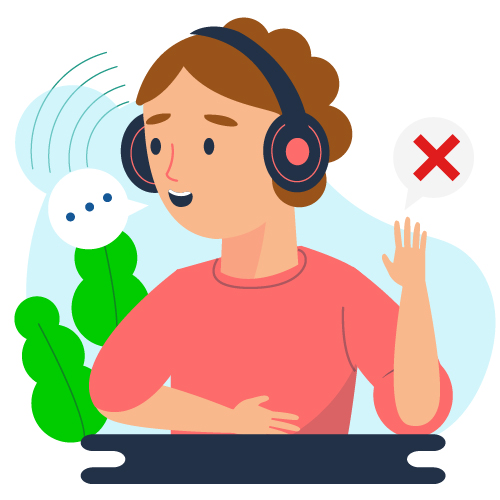IELTS test day advice!
We’ve included some ideas and information to assist you understand what to anticipate on test day because we want you to perform well on your IELTS exam.
To ensure that everything goes as smoothly as possible on test day and that you receive the necessary IELTS score, follow our advice.
IELTS is a difficult exam. You may lessen your tension by being familiar with all the different work kinds, as well as by making sure you know all the regulations and have everything under control on test day. Four important ideas, as well as some dos and don’ts, are provided below.
Test day administration
You must present the identity document you used to complete your IELTS test application on the day of your tests (both for the written assignments and the IELTS Speaking exam). Two similar passport-sized pictures may also be required. To see whether this applies to you, check the test documentation.
Arriving at the testing location
Check the IELTS test start time in advance and make sure you know how to arrive at the testing location in plenty of time. To ensure that you are completely ready, we advise completing this a week beforehand.
Remember to double-check the location of your IELTS exam since it could not be the same as the testing facility where you made your test reservation.
supplies for the test day
Only pens, pencils, and erasers are permitted in the exam. For the Listening and Reading examinations, don’t forget to write your answers in pencil because the processing equipment cannot read ink. (This only applies to IELTS tests taken on paper; not to IELTS tests taken online.)
getting to the IELTS exam location
Make sure you have read and comprehend the IELTS exam terms and conditions since they contain crucial details on the day of your test. These are included in the section of your application form titled Test Takers Information.
You might not be able to participate in your IELTS exam if you are late.
Your phone and all other electronics should be turned off. Along with other personal items, these will be kept outside the examination room.
The combined time for listening, reading, and writing is 2 hours and 40 minutes. Please be aware that the exams will not be interrupted.
Except for water in a clear container, you are not permitted to bring food or beverages inside the testing area. Before your test, make sure you eat something substantial.
Points are time… valuable points
You cannot stop the clock so that you can use the restroom. You are not spending the time on your test when you are in the bathroom. Those few minutes might be the difference between you receiving the necessary IELTS band score. So before entering the test room, make sure you are relaxed and not disturbed.
Your identification cards
The documentation you got when you enrolled for the exam will specify which ID you’ll need. You won’t be allowed to take the exam if you show up without the proper identification.
Before you take the exam, IELTS staff will snap a picture of you as an additional security safeguard. You will use this image on your test report form.
You can also be required to provide a finger scan in some nations.
Remember to attentively follow all directions and keep in mind that you will need to write a certain amount of words for the Writing sections of the test.
In order to give yourself adequate time to respond to each topic, certain questions have suggested time restrictions that you should adhere to.
If you start to feel anxious or tense, keep your cool and breathe deeply.
Exam Day IELTS Reading Test Tips
The following are some IELTS reading exam ideas and strategies:
- Determine how many words you’ll need for the solution by carefully reading the instructions.
- It is advised not to spend too much time on a single solution. Moving on to the next question if you are unable to respond to the first one saves you time.
- The significance of keeping track of time is equally crucial.
- Directly on the answer sheet, enter your responses. The answers cannot be transferred later because of time constraints.
- Don’t divide the quantity of questions by the allotted amount of time. This is because it will take more time to understand how the content is organized for the first few responses. The secret is to answer questions quickly.
- You can read the paragraph after reading the questions or the other way around. It is best to practice both methods before focusing on one because it differs for each person.
Be careful not to end up paraphrasing. - Keep in mind that finding the solutions is more important than understanding the text. Read appropriately.
- It is advised that you capitalize each of your responses to reduce the likelihood of misunderstanding.
Tips for the IELTS Speaking Test on Exam Day
- Below are some more exam-day strategies for passing the IELTS speaking test.
- Practice speaking English on a regular basis before taking the IELTS exam. Learn how to voice your ideas on a range of subjects.
- Keep in mind to be assured and amenable to conversation. It’s not a job interview, this. You must be approachable and open.
- It is crucial to pay close attention to the questions being asked. Avoid waffling and get to the point with your questions. This holds true for both Parts 1 and 3 of the speaking test.
- Do not be afraid to provide details in your responses. However, it is advisable to keep in mind the time allotted, and you must maintain concentration throughout.
- Tips for the IELTS Writing Test on Exam Day
- IELTS speaking module advice will be covered in this section.
- Give yourself as much time as you can to think about the solutions. Once you are certain of what you want to express, you can write quickly and precisely. Before you begin writing, organize your strategy for one or two minutes.
- It is advised that you complete Task 1 in no more than 20 minutes and Task 2 in no more than 40 minutes. Keep an eye on the time to prevent you from calculating it incorrectly.
- Do not waste time word-for-word counting. Estimate your word count based on the number of lines you have written.
- It is advised to create a concise outline for Academic Task 1. When writing your letter for General Training, be sure to address every topic that was addressed.
- Don’t say things, words, or phrases more than once. It’s a deadly mistake. Allow time to go back and check that your responses are still correct.
- Never overlook the resolution of Task 2.
Keeping the aforementioned IELTS advice in mind, it’s also crucial that you keep your composure and ability to give optimum effectiveness. As with everything, practise will help with this. You may also look for advice from professionals at Leap Scholar who can provide you time management tips and strategies. You can stay one step ahead of the competition and ace your IELTS test by doing this.



